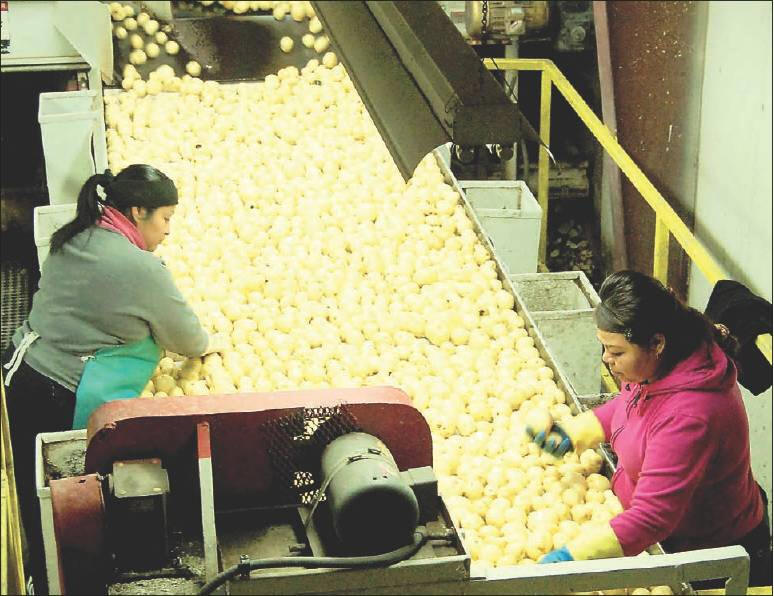Oregon farmers will absorb additional cost to stay competitive
by JOEL ASCHBRENNER, Herald and News 1/5/12
 |
H&N photo by Joel Aschbrenner Workers sort pike potatoes
Wednesday at Gold Dust Potato Processors near Malin. The company employs about 60 people year-round and 110 people during harvest. Oregonís 30-cent minimum wage increase will mean higher labor costs for local agricultural employers.
|
The cost of labor, a major expense for producers, is increasing in Oregon. Or, depending on your point of view, the lowest-paid workers are getting a pay increase on par with the cost of living.
Oregonís hourly minimum wage increased from $8.50 to $8.80 Jan. 1. Itís the second highest minimum wage in the country, behind only Washington state.
For a full-time employee making minimum wage, the increase represents an annual pay increase of $624. For employers, it means that much more in expenses.
Producers say the increase is an added expense they canít pass on to customers.
ďOur prices are dictated to us, so we have to absorb all that,Ē said local farmer Bob Flowers about the 30-cent increase. Flowers is president of the Klamath-Lake Counties Farm Bureau.
Because farmers sell at wholesale prices, they compete with producers from other states where the minimum wage is lower. Producers in those states have a competitive advantage, Flowers said. Just 10 miles south of his farm near Midland, the California minimum wage is 50 cents less.
Producers of labor intensive crops, like potatoes, onions, horseradish, organic crops and strawberry starts, will be most impacted by the wage increase, said Greg Addington, executive director of the Klamath Water Users Association.
At Gold Dust Potato Processors, labor is the second largest expense, behind fertilizer, said Tricia Hill, controller at the Malin potato shed. Gold Dust employs 50 to 60 workers year round and about 110 during harvest.
ďItís going to add some significant expense to our product,Ē Hill said about the minimum wage increase.
Others say the minimum wage is an important tool to ensure the lowest-paid workers can make a fair living.
ďThatís what itís designed to do: make sure the lowest wage people donít fall behind,Ē said Chuck Sheketoff, executive director of the Oregon Public Policy Center, about the increase. ďAnd itís a very modest increase.Ē
When margins are thin, Flowers said, even a modest increase in the minimum wage can be difficult for producers to afford.
ďDonít get me wrong, I think itís great that we get money to people who need it, but we need to keep our industry healthy, too,Ē he said.
Oregonís minimum wage is tied to the Consumer Price Index. It increases at the same rate the cost of every day goods do. The annually-adjusted minimum wage ensures workers can pay for food, housing, gas and hopefully health care, Sheketoff said. Because itís tied to the CPI, employers should be able to track and predict increases, he said.
The minimum wage has increased every year except 2010 since a 2002 law tied it to the CPI.
Cellphone law exempts farm drivers
A new cellphone law that took effect Jan. 1 in Oregon includes a loophole for farmers and ranchers, but industry leaders urge producers not to abuse it.
The law tightens restrictions for cellphone use while driving. Only the drivers of emergency vehicles, tow trucks and farm vehicles will be allowed to talk on hand-held cellphones while driving, provided the call is related to their work.
Previously, drivers were allowed to talk on the phone if they were making a work-related call while driving for their job. The loophole was so large, police said, they could not enforce the law.
The Oregon Farm Bureau, in a memo last week, asked producers to use caution while talking on the phone behind the wheel. The new law wonít prevent police from ticketing farmers and ranchers for distracted driving but will give producers a defense against the fine, according to the memo.
Hands-free cellphone devices are permitted for drivers over 18. Itís illegal for anyone to text while driving.
Cellphones replaced two-way radios on farm operations years ago. Theyíre an important tool for producers who often must coordinate with employees working in different fields, said Bob Flowers, president of the Klamath-Lake Counties Farm Bureau.
Thereís a learning curve but older farmers will eventually get the hang of technology like hands-free devices, Flowers said Wednesday while driving and using his own hands-free cellphone device.
|
|

